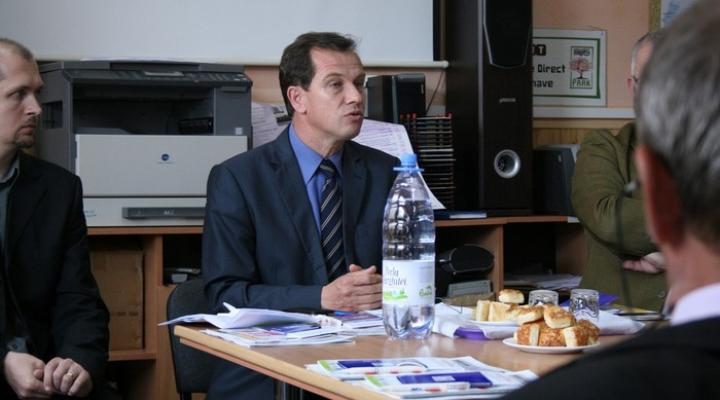Csaba Sógor discussed EU issues with mayors in Mures County
DAHR MEP Csaba Sógor met with mayors and local administration employees from Mureș County to discuss current European Union issues and EU funding opportunities. The meeting series hosted by the local territorial organisation of the DAHR took place on the 7th and 8th of June on three locations: Sângeorgiu de Pãdure, Târgu Mureș and Târnãveni.
The president of the Mureș County territorial organisation of the DAHR, Zsombor Brassai, and Attila Gáti, an expert in EU co-financed projects from the PONT Group, also attended the event.
In the opening of the discussions, Csaba Sógor expressed his view that the Hungarian community from Transylvania has to think for the long term. Such a long term thinking example is the EU 2020 strategy, which sets goals for member states in the field of education, research, job creation and fight against poverty. In the opinion of the MEP, the member states with a better use of EU funds are more successful. Romania has a strong deficit in this area, as it managed to use only 13% of the Structural Funds allocated to it in the 2007-2013 multiannual framework.
As a member of the Employment and Social Affairs Committee of the European Parliament, Csaba Sógor also spoke about the problems of the labour market. “Currently there are 25 million EU citizens who don’t have a job. One of our society’s most valuable resource is the workforce, thus it is only reasonable that we invest in human resources” – said the MEP, stressing, that we also need to include NGOs in this process.
Attila Gáti, an expert of the PONT Group pointed out that there are currently thirty different open calls for project proposals within the Human Resources Development Operational Programme for labour market support measures. He also presented the calls of the Norway Grants for social projects. The deadline of the above is the 29th of June.
Attila Gáti mentioned that the N+3 rule applies in the case of Romania, too and that it allows our country to use up funds that should have been spent this year until 2016.
“This may also present some problems, as the new multiannual framework starts in 2014. There might be an increase in the number of applications which could lead to an overburdening of the system and thus the extension of the period in which the projects are evaluated” – warned the specialist.
In the opening of the discussions, Csaba Sógor expressed his view that the Hungarian community from Transylvania has to think for the long term. Such a long term thinking example is the EU 2020 strategy, which sets goals for member states in the field of education, research, job creation and fight against poverty. In the opinion of the MEP, the member states with a better use of EU funds are more successful. Romania has a strong deficit in this area, as it managed to use only 13% of the Structural Funds allocated to it in the 2007-2013 multiannual framework.
As a member of the Employment and Social Affairs Committee of the European Parliament, Csaba Sógor also spoke about the problems of the labour market. “Currently there are 25 million EU citizens who don’t have a job. One of our society’s most valuable resource is the workforce, thus it is only reasonable that we invest in human resources” – said the MEP, stressing, that we also need to include NGOs in this process.
Attila Gáti, an expert of the PONT Group pointed out that there are currently thirty different open calls for project proposals within the Human Resources Development Operational Programme for labour market support measures. He also presented the calls of the Norway Grants for social projects. The deadline of the above is the 29th of June.
Attila Gáti mentioned that the N+3 rule applies in the case of Romania, too and that it allows our country to use up funds that should have been spent this year until 2016.
“This may also present some problems, as the new multiannual framework starts in 2014. There might be an increase in the number of applications which could lead to an overburdening of the system and thus the extension of the period in which the projects are evaluated” – warned the specialist.











